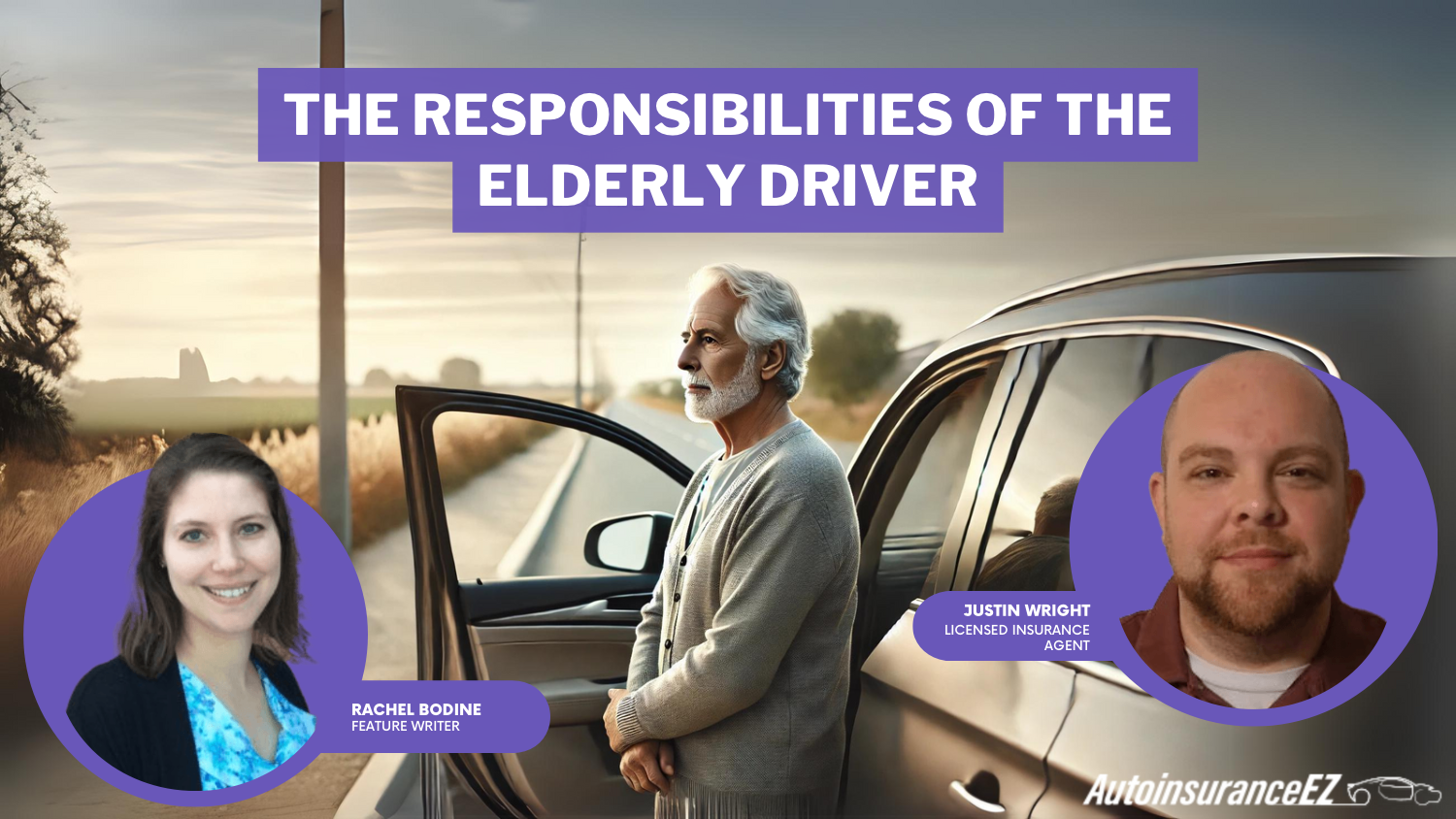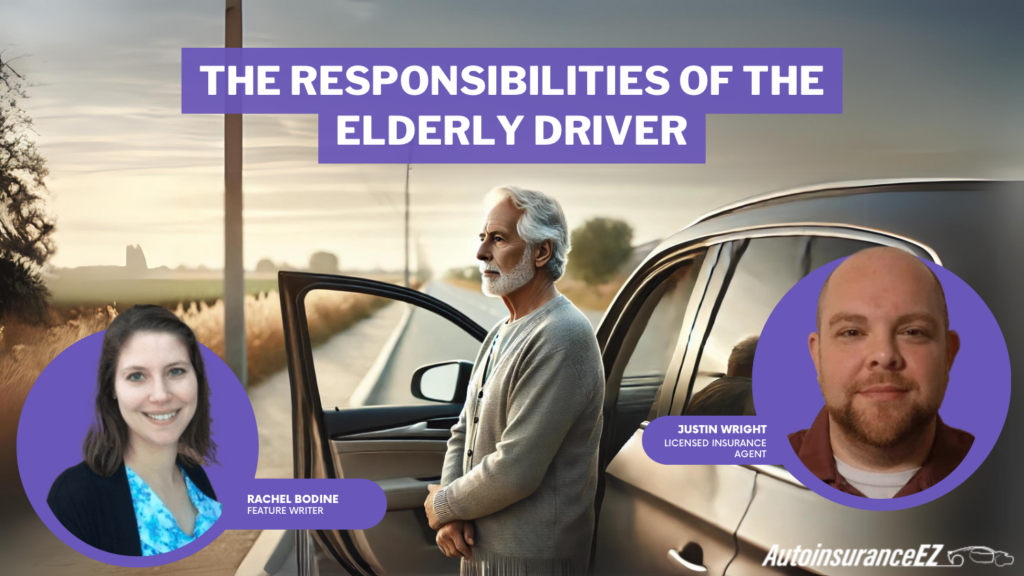The Responsibilities of the Elderly Driver
If you are 65 years old or older, your insurance company may consider you an elderly driver. Elderly drivers are required in certain states to have regular vision screenings and take regular in-person driving tests to make sure they are still capable of driving safely. Many elderly drivers face higher-than-average car insurance rates, but you can always shop around online for quotes from other companies to try and save money on your car insurance as an elderly driver.
Read more
Free Auto Insurance Comparison
Compare Quotes From Top Companies and Save
Secured with SHA-256 Encryption
Justin Wright
Licensed Insurance Agent
Justin Wright has been a licensed insurance broker for over 9 years. After graduating from Southeastern Seminary with a Masters in Philosophy, Justin started his career as a professor, teaching Philosophy and Ethics. Later, Justin obtained both his Property & Casualty license and his Life and Health license and began working for State Farm and Allstate. In 2020, Justin began working as an i...
Licensed Insurance Agent
UPDATED: Mar 10, 2025
It’s all about you. We want to help you make the right coverage choices.
Advertiser Disclosure: We strive to help you make confident insurance decisions. Comparison shopping should be easy. We partner with top insurance providers. This doesn’t influence our content. Our opinions are our own.
Editorial Guidelines: We are a free online resource for anyone interested in learning more about auto insurance. Our goal is to be an objective, third-party resource for everything auto insurance related. We update our site regularly, and all content is reviewed by auto insurance experts.
UPDATED: Mar 10, 2025
It’s all about you. We want to help you make the right coverage choices.
Advertiser Disclosure: We strive to help you make confident insurance decisions. Comparison shopping should be easy. We partner with top insurance providers. This doesn’t influence our content. Our opinions are our own.
On This Page
If you are 65 years of age or older, you may be considered an elderly driver by your insurance company. Elderly drivers can sometimes face higher monthly auto insurance rates because their age group is found to be at fault in a significant percentage of overall car accidents.

If you are in your 70s or older and are still driving — or if you have a parent or grandparent who is in this situation — it’s a good idea to learn more about what is expected of you as an elderly driver and what you can do to lower your car insurance rates.
- Many insurance companies consider people who are 65 years old or older to be elderly drivers
- Elderly drivers can face car insurance rates that are significantly higher than average
- Some states have strict rules for elderly drivers that require both vision screenings and in-person driving tests
What does it mean to be an elderly driver?
Many car insurance companies consider you an elderly driver if you are 65 years old or older and you have a valid driver’s license. Some insurance companies do not place policyholders in the category of elderly until they are in their early to mid-70s. Ultimately, it depends on who your insurer is.
Being defined as an elderly driver does not mean anything specific about your driving history or about the type of driver you are on the road. But depending on where you live, you may find that your state has specific requirements when it comes to keeping your driver’s license up-to-date.
Read More: When should the elderly stop driving?
The table below shows the different requirements for elderly drivers in all 50 U.S. states.
Elderly Driving Laws by State
| State | Elderly Driving Requirements |
|---|---|
| Alabama | No special requirements |
| Alaska | Drivers must renew in person and pass a vision test starting at 69 |
| Arizona | Drivers must renew in person and pass a vision test starting at 65 |
| Arkansas | No special requirements |
| California | Drivers must renew in person starting at 70 |
| Colorado | Drivers must renew every five years, starting at 61 |
| Connecticut | Drivers may choose to renew every two years to save money, starting at 65 |
| Delaware | No special requirements |
| Florida | Drivers must renew every six years, starting at 80 |
| Georgia | Drivers must pass a vision test at every renewal, starting at 65 |
| Hawaii | Drivers must renew every two years, starting at 72 |
| Idaho | Drivers must renew every four years, starting at 63 |
| Illinois | Drivers must renew in person and take a road test, starting at 75 |
| Indiana | Drivers must renew in person, starting at 70 |
| Iowa | Drivers must renew every two years, starting at 70 |
| Kansas | Drivers must renew every four years, starting at 65 |
| Kentucky | No special requirements |
| Louisiana | Drivers must renew in person, starting at 70 |
| Maine | Drivers must pass more frequent vision tests starting at 40 and renew every four years, starting at 65 |
| Maryland | Drivers must provide a vision report at every renewal, starting at 40 |
| Massachusetts | Drivers must renew in person, starting at 75 |
| Michigan | No special requirements |
| Minnesota | No special requirements |
| Mississippi | No special requirements |
| Missouri | Drivers must renew every three years, starting at 70 |
| Montana | Drivers must renew every four years, starting at 75 |
| Nebraska | No special requirements |
| Nevada | Drivers must renew every four years, starting at 65 |
| New Hampshire | No special requirements |
| New Jersey | No special requirements |
| New Mexico | Drivers must renew every four years, starting at 67 and every year, starting at 75 |
| New York | No special requirements |
| North Carolina | Drivers must renew every five years, starting at 66 |
| North Dakota | Drivers must renew every four years, starting at 78 |
| Ohio | No special requirements |
| Oklahoma | No special requirements |
| Oregon | Drivers must pass a vision test every eight years, starting at 50 |
| Pennsylvania | Drivers may choose to renew every two years |
| Rhode Island | Drivers must renew every two years, starting at 75 |
| South Carolina | Drivers must renew every five years, starting at 65 |
| South Dakota | Drivers must provide a vision report, starting at 65 |
| Tennessee | No special requirements |
| Texas | Drivers must renew in person, starting at 79 and renew every two years, starting at 85 |
| Utah | No special requirements |
| Vermont | No special requirements |
| Virginia | Drivers must renew every five years, starting at 75 |
| Washington | Drivers must renew in person, starting at 70 |
| Washington, D.C. | Drivers must renew in person and provide certification of physical and mental competence, starting at 70 |
| West Virginia | No special requirements |
| Wisconsin | No special requirements |
| Wyoming | No special requirements |
As you can see, some states require you to take regular vision tests as well as in-person driving tests once you hit a certain age. Depending on how well you see and how quick your reflexes are, these regular tests could start to pose a major problem if you want to maintain your driver’s license as you age.
Enter your ZIP code below to compare auto insurance rates.
Secured with SHA-256 Encryption
Can I stop an elderly person from driving?
If you want to know how to stop an elderly person from driving, there’s really not much you can do aside from encouraging them to stay up-to-date on their vision screenings and take a specific driving test for elderly drivers.
In states that do not require elderly drivers to meet specific requirements for their license as they age, figuring out how to stop elderly parents from driving can be frustrating and scary. This is especially true if you have witnessed your parent or grandparent make bad judgment calls while behind the wheel.
If you are worried that your parent or grandparent is driving and simply shouldn’t be, the best thing you can do is have a conversation with them in which you voice your concerns. You can also request that they speak to their primary care physician to get an unbiased expert opinion.
Read more: How To Stop Elderly Parents From Driving
How much is car insurance for elderly drivers?
The amount an elderly driver will pay in monthly car insurance rates depends on a variety of factors. Some of the most common factors that insurance companies look at when determining rates include:
- A person’s age
- A person’s driving record
- The amount of coverage requested
- The vehicle being covered
- The ZIP code
- A person’s gender
The list above is not exhaustive, but it gives you a good idea of what insurance companies will look for. If you are elderly, male, or have any blemishes on your driving record, you can expect to pay a higher-than-average rate for your auto insurance coverage.
The table below shows average annual car insurance rates for elderly drivers with different car insurance companies based on driving records.
Average Car Insurance Rates for Elderly Drivers Based on Driving Record
You can see by the table above that most car insurance companies vary significantly in what they will charge an elderly driver based on his or her past driving experience. Additionally, if an elderly driver wants full coverage on the vehicle, monthly or annual rates will automatically be more expensive.
How can elderly drivers find cheap car insurance?
If you are considered an elderly driver and are concerned that your car insurance rates are too expensive, the best thing you can do is shop around online for more reasonable coverage. Compare quotes from multiple car insurance companies to figure out where you can find the best coverage at the most affordable rate.
You may also consider adding yourself to a child’s policy. This could help you receive multi-policy discounts, which may end up dropping your monthly rates significantly. If you know you want to stay on with your current insurance company if at all possible, speak to a representative to see if there are other car insurance discounts you may qualify for.
Enter your ZIP code below to compare auto insurance rates.
Secured with SHA-256 Encryption
Justin Wright
Licensed Insurance Agent
Justin Wright has been a licensed insurance broker for over 9 years. After graduating from Southeastern Seminary with a Masters in Philosophy, Justin started his career as a professor, teaching Philosophy and Ethics. Later, Justin obtained both his Property & Casualty license and his Life and Health license and began working for State Farm and Allstate. In 2020, Justin began working as an i...
Licensed Insurance Agent
Editorial Guidelines: We are a free online resource for anyone interested in learning more about auto insurance. Our goal is to be an objective, third-party resource for everything auto insurance related. We update our site regularly, and all content is reviewed by auto insurance experts.


